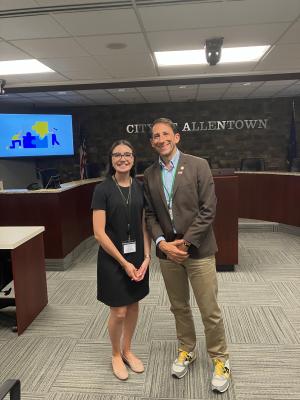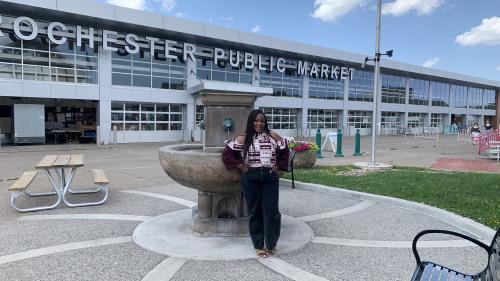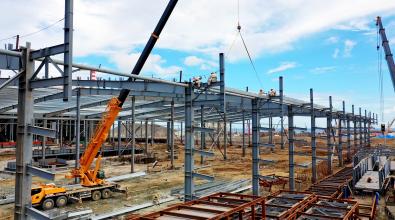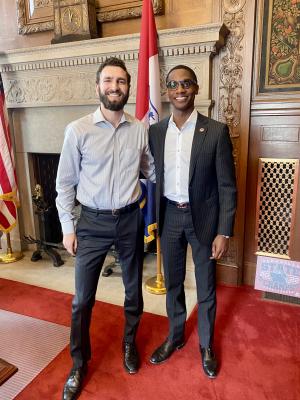 Read More
Read More
How these grad students helped cities act on mayoral priorities

Cities around the world have great ambitions when it comes to addressing their biggest challenges; however, they don’t always have the resources they need to drive rapid progress on these goals. This past summer, 16 cities had a unique opportunity to bridge that gap when, as part of the Bloomberg Harvard City Leadership Initiative, a Harvard summer fellow was assigned to their city hall to help accelerate action on a mayoral priority.
In just 10 weeks, each of these graduate students made significant headway, not the least of which was demonstrating what a difference fresh eyes and dedicated capacity can make when aimed at a city’s most important challenges. Bloomberg Cities spoke with three of these Harvard summer fellows to learn more about their efforts and what their experience can teach all city leaders.
Leveraging new capacity and unique perspectives to turbocharge progress.
Summer Fellow Alejandra Fernández. Courtesy of Bloomberg Harvard City Leadership Initiative
Last June, Allentown, Pa., Mayor Matt Tuerk gave Alejandra Fernández a pretty big job for a summer fellowship. Her mission: Make city hall services more accessible to Spanish-speaking residents.
Fernández was up for the challenge. She had just finished a Master’s degree in design studies at the Harvard Graduate School of Design and was eager to begin making a difference in people’s lives. “I’m Hispanic, so for me, it was very important to [work in] a city that wanted to focus on providing better services to this population,” says Fernández, who is from Costa Rica. Hispanics “are not even a minority group in Allentown. They’re the majority.”
Dedicating someone to this work was key to the city breaking new ground. By summer’s end, Fernández collected the city’s first-ever data on its bilingual employees and how they’re being deployed; created an inventory of all city documents and forms that require translation; developed a pilot Spanish-as-a-second-language program for employees; and designed a language access plan for Allentown, including recommendations for staff training and service delivery.
“This has supercharged our equity and inclusion work,” says Chief Innovation Officer Laura Ballek-Cole, who supervised Fernández and said her work over the summer also helped the city identify where to deploy future resources. “We have a roadmap for how we’re going to implement these things and now have put into next year’s budget a language access coordinator, knowing that this is a lot of work.”
Moving the needle on long-term priorities.
All Harvard summer fellows are assigned to work on their mayors’ top priorities. In Rochester, N.Y., that meant helping Mayor Malik Evans expand residents’ access to healthy food. That mission resonated with Tega Ogodo, a Nigerian who’s pursuing her Master’s degree in urban planning at the Harvard Graduate School of Design. “I don’t have a background in food,” she says, “but I’ve always worked in spaces that question: How can we bring resources to people? How can we make sure underserved communities get the basic quality and at an affordable rate? I was curious to see how that can work in the U.S.”
Food access is a big issue, and 10 weeks is not a long time. So a big part of Ogodo’s focus was building tools for others to use in the months and years to follow, a valuable lesson for cities looking to ensure short-term innovation resources yield long-term impact. One of those tools, a survey instrument that assesses the availability and quality of foods at neighborhood stores, is now helping power a program, funded by $5 million in federal American Rescue Plan Act (ARPA) dollars, to assist grocers in upgrading their food selection and then letting residents know where they can access healthier foods. “Ten weeks is short,” Ogodo says, “so I wanted to focus on what I can do that will leave the city a solid next step to achieve that big vision of food equity and healthy food access.”
Alan Neider took a similar approach to his fellowship in Cleveland. Neider, who is from New York state and working toward his Master’s in business administration, was tasked with helping the city find ways to turn a surplus of tax-foreclosed properties into opportunities to create affordable housing. He immediately got to work analyzing a list of more than 1,000 auction-bound properties to identify homes that were good candidates.
Then, because the list of these properties is always growing, Neider created a framework for the city to continue assessing such opportunities, which he then presented to Mayor Justin Bibb. “There’s a need to look at this problem in a structured and data-driven way,” Neider says, “because these properties are continuously coming through the pipeline, and at this point, there’s a lot of them.”
Adding new dimensions to old ways of working.
Neider says he came to city hall with a humble attitude, fully aware that much of the knowledge—and most of the relationships—he’d need would take time to build. At the same time, as an MBA candidate with a background in the healthcare field, he had a fresh perspective to offer on a problem Cleveland has been wrestling with for years.
Summer Fellow Alan Neider. Courtesy of Bloomberg Harvard City Leadership Initiative
That showed through when Neider began to see that there were a lot of organizations making different kinds of investments in the city’s Southeast Side. To help him understand what initiatives were happening where, he paired up with a city expert in geographic information systems to map them. Now that map is helping other city leaders and partners identify connections and potential synergies in their work.
“When you have someone young and energetic with new ideas come into an organization with a lot of people who have been here a long time, it infuses a lot of new enthusiasm in the work,” says Sally Martin-O’Toole, director of building and housing and Neider’s supervisor for the summer. “Because a fellow can come in and see things very differently than we may have seen them looking at it for a long time.”
Fernández also knew that her success in Allentown would depend on building relationships—with everyone from department heads to frontline workers to residents seeking services. She spent much of her first month meeting with all of them. “That was key because this is not my work—it’s the work of every single person in the city who provided information or data, or gave me their time just so I could listen to them,” she says. Having that buy-in was critical when Fernández set out to survey city employees about their language skills, for example. “This process would not have been possible without the complete cooperation of every single department.”
Building a pipeline for new public-service talent.
Fernández, Ogodo, and Neider all say their city hall experiences make them more interested than ever in the prospect of working in local government. At a time when local governments are suffering a severe labor shortage, that’s a good thing to hear.
Fernández says she had a hunch going into the fellowship that public service was the career path she wanted. Two things made her sure of it. One was the dedication she saw in her Allentown colleagues to improve services for residents. The other: “It just felt so gratifying to know that the work you’re doing is going to serve other people,” she says. “It’s really important for me to have a worthwhile job where I can feel like I have a purpose that goes beyond myself. Doing it for the first time in the capacity that I did in Allentown feels really fulfilling.”
For Ogodo, part of the appeal of the public sector is the opportunity to work closely with residents. In Rochester, she was especially moved by an experience she had meeting with youth. “They were surprised first about my accent, and also by where I go to school,” Ogodo says. “That’s one of the opportunities that comes with connecting with youth. They get to see people who look like them…and see that they can come up and do these things as well.”
Meanwhile, now back at the Harvard Business School, Neider has become something of an ambassador from the public sector. With his fellow MBA candidates, he trumpets the idea that local government can be an excellent place to work, either as a career—or, as he envisions for himself, as one stop in what may well be a zig-zagging path between the public, private, or nonprofit sectors.
He especially enjoys telling classmates how the mayor he worked for, Justin Bibb, also has an MBA (from Case Western Reserve University) and previously worked as a bank executive. At one point during the summer, Neider did an Instagram interview with Bibb where the mayor made a direct we-need-you appeal to business students. “For me, hearing that and filming it from behind my phone, that felt so confirming,” Neider says. “And I really want to get more people to be feeling the way I’m feeling right now, too.”



